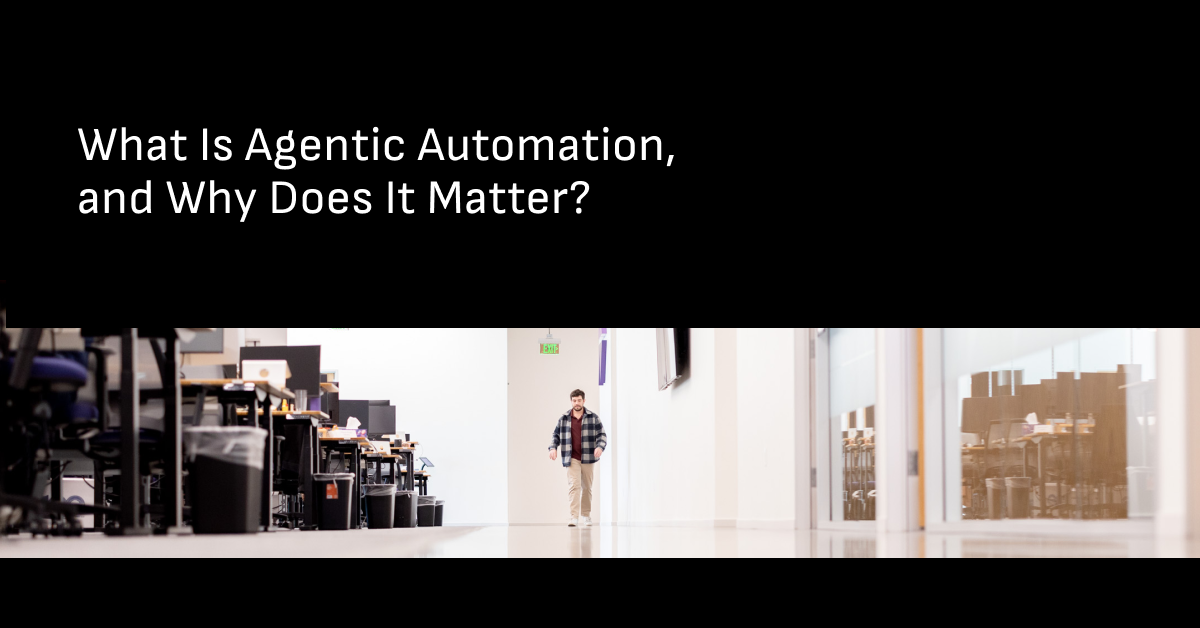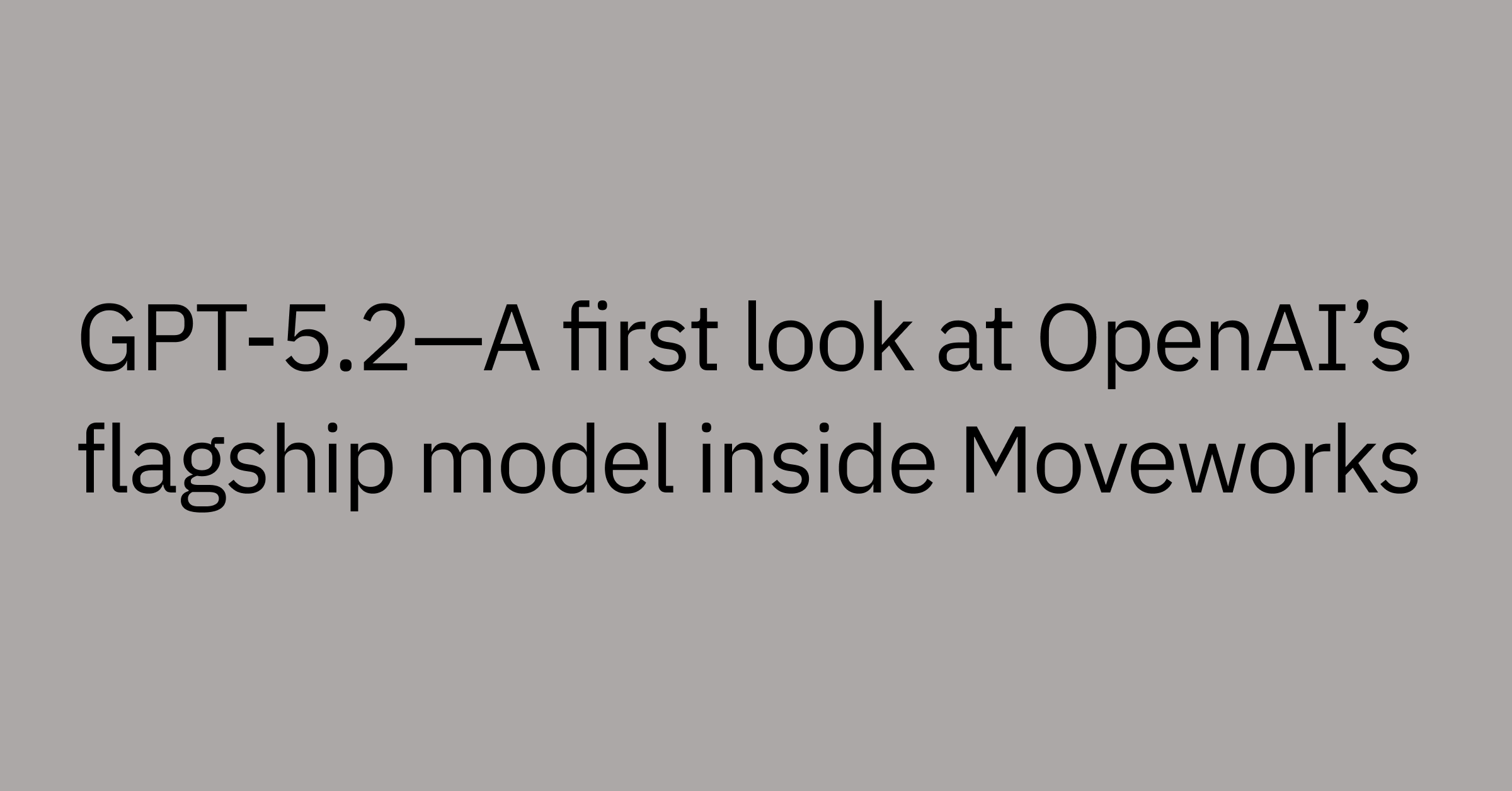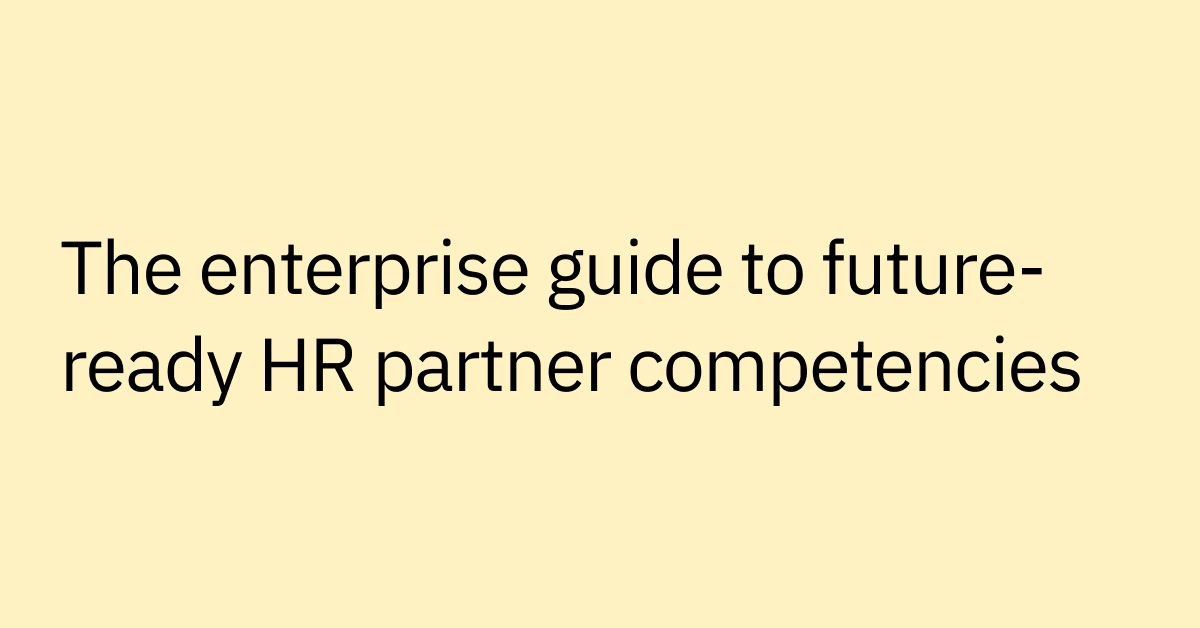Table of contents
We’re entering a new phase of automation—one driven in large part by agentic automation. Now AI systems don’t just follow predefined rules but can even reason and operate independently, learning and making decisions with minimal human intervention.
So you want to better understand agentic automation, and are looking for a technology that can keep up with more dynamic, fast-paced operational environments. Other leaders are too, with one study by Gartner predicting that by 2028, 33% of enterprise software applications will incorporate agentic AI to help manage complex tasks and workflows.
That’s because agentic AI provides the flexibility, efficiency, and scalability necessary to achieve these goals while helping your business stay agile to accommodate shifting needs and operational demands.
In this blog, we’ll explain agentic automation, how agentic AI enhances decision-making, streamlines workflows, and unlocks new levels of scalability for modern enterprises.
What is agentic automation?
Automation involves utilizing hardware, software, and algorithms that’s programmed with fixed rules to execute repetitive tasks with little to no human involvement.
However, agentic automation, applies agentic artificial intelligence (AI) to automation, enabling it to work smarter and take action.
Unlike traditional automation tools which rely on predefined workflows, agentic AI can dynamically adjust its approach based on real-time data, learning from interactions and take autonomous actions to accomplish goals without constant human intervention.
You may have even already interacted with an agentic automation without even realizing it. Many virtual assistants, like Alexa and Siri, rely on agentic AI to recall personal preferences and actively improve their users’ experiences. Now just think of what it can accomplish when applied to a business at scale.
Agentic automation is becoming the preferred AI technology for business optimization because of its flexibility, autonomy, and ability to handle complex, multi-step tasks with greater autonomy.
How does agentic AI automation work?
Agentic automation takes advantage of multiple advanced technologies. It combines large language models (LLM) that understand and generate human-like text, large action models (LAM) that decide what actions to take and carry them out, and generative AI that creates new content, such as text, images, or ideas. Agentic automation is unique in that it’s able to take actions and execute tasks without direct user interaction.
However, agentic AI can do much more than just carry out a static list of tasks. Digital agents are able to perceive their environment while using their data to reason about the best course of action. Based on this reasoning, they can act on specific, user-created goals and make independent decisions about the best way to meet them.
Learn more about how agentic automation is helping businesses redefine their workflows to maximize productivity.
Agentic vs. intelligent vs. robotic process automation
Due to overlapping terms, business automation methodologies are often confused. However they can be easier to understand than you would think.
- Robotic process automation (RPA) refers to programming that follows predefined rules to complete repetitive tasks like data entry or invoice processing.
- Intelligent automation (IA) builds on RPA by incorporating artificial intelligence (AI) and machine learning, enabling more advanced decision-making.
Agentic automation is no different, but key differences set it apart. Put simply, agentic AI combines the best of both worlds. It provides seamless automation capabilities while intelligently orchestrating workflows for better results. Understanding these distinctions helps businesses select the right automation strategy for their needs.
Key characteristics of agentic AI
Able to make decisions, and pursue goals with minimal human intervention, here are the key characteristics of agentic AI:
- Autonomy: Agentic AI systems can function without continuous human oversight. They can also execute tasks, make decisions, and adapt to changing conditions.
- Goal-oriented behavior: These systems pursue specific, user-created objectives and can break them down into sub-goals. They can even optimize actions to achieve desired outcomes.
- Reasoning and problem-solving: They can analyze complex problems, plan solutions, and adjust strategies dynamically.
- Adaptive learning: They improve over time through machine learning and reinforcement learning. They even learn to adjust their responses based on past experiences and new data.
- Decision-making capability: Agentic AI can make informed decisions based on available information. Often weighing trade-offs, assessing risks, and optimizing choices.
- Proactive behavior: Instead of waiting for human instructions, agentic AI can anticipate needs and take action. It can even schedule tasks, initiate workflows, or automate processes.
These key features are why agentic automation is transforming business optimization. Agentic AI empowers businesses to automate complex, multi-step tasks, dynamically adapt to real-time data, and make intelligent decisions without constant human intervention.
This adaptability is essential for companies navigating increasing data volumes, operational complexities, and fast-changing business environments. By enhancing workflow management, customer service, and business process automation, agentic AI can improve efficiency and cost savings.
AI-powered automation
AI-powered automation, or "intelligent" automation, is commonly used in a wide range of AI-driven tools and apps. Automation tools can use AI to intelligently analyze data, make real-time decisions, and continuously optimize workflows, thereby enhancing efficiency and accuracy in various tasks.
Some examples of intelligent automation include fraud detection monitoring systems and predictive analytics solutions. However, while these tools can operate independently, they do have certain limitations when applied to more dynamic or action-oriented automation tasks, such as:
- Reliance on redefined tasks and rule-based processes
- Limited ability to take action in real-time without human intervention
- Difficulty adapting to more change-prone scenarios
Because of its limitations, intelligent automation is better suited for more predictable business tasks. While this can be helpful in applications like data analysis, report generation, or data entry – agentic automation can add more flexibility and less reliance on rule-based tasks or processes that are defined and executed based on a set of pre-determined rules or conditions.
Robotic process automation (RPA)
Robotic process automation leverages pre-configured "bots" to carry out various activities. RPA breaks down tasks into a series of steps that bots follow based on required frequency or when triggered by certain events.
Businesses commonly rely on RPA solutions to execute time-consuming administrative functions like record keeping, invoice processing, or crawling web pages for data. However, as with intelligent automation, there are some limitations to be aware of when deploying RPA tools, including:
- Challenges adapting to applications updates or navigational point changes
- Difficulty handling real-time data collection
- Dependence on predictable, standardized business processes with clear instructions to follow
While RPA isn't inferior to other forms of AI, including agentic automation, it is best suited for predictable, repetitive tasks. However, when used in conjunction with agentic AI, businesses can create holistic, nearly hands-off automation solutions.
This reduces the technical expertise required when offloading repetitive tasks to RPA bots while also leveraging agentic capabilities to keep your tools more intelligent and responsive.
7 benefits of agentic automation
Agentic automation opens up a world of possibilities for businesses looking to accelerate operations in dynamic environments. Agentic AI can make it easier for development teams to maximize their output and gives business leaders a way to introduce highly supportive and personalized experiences for all employees too.
Below are seven of the most impactful benefits that agentic automation can provide for your business.
1. Manage dynamic automations
Although GenAI tools like ChatGPT are regularly adopted by businesses today, they aren't designed to carry out dynamic or more complex business processes. Agentic automation is different. It isn't tethered to a fixed format to execute commands.
Instead, agentic AI systems are highly adaptable and can effectively respond to unexpected situations. This adaptability is crucial as a business and its processes evolve.
AI agents can adjust their actions based on the parameters of their design and continuously seek ways to improve their effectiveness.Their automated decision-making processes let businesses use them for advanced and time-sensitive applications without needing to control their activities directly.
2. Increase efficiency
Many IT teams and developers are looking for opportunities to automate their tasks. Unfortunately, some AI solutions require much more hands-on management than expected. Whether it’s outlining parameters or monitoring for accuracies, this additional work can quickly lead to diminishing returns.
Agentic AI can help to maximize the efficiency of workload automation by continuously improving its performance over time and allowing teams to focus on other critical priorities.
3. Enhance flexibility
An agentic automation platform can provide organizations with more flexible ways to address their business needs. Because AI agents can monitor real-time data sources and dynamically respond to changing conditions, they are agile enough to react to increased demand, unexpected disruptions, and new information.
This flexibility means you can spend less time conceptualizing how your automation should work and more time actively benefiting from it. Agentic AI solutions keep optimizing their strategies, can adapt to new information and then find optimal ways to accomplish their goals.
4. Improve accuracy
While business automation is useful, executing tasks at scale can be risky if errors exist in datasets or assigned workflows. Although many AI tools can help minimize common human errors when performing repetitive tasks, not all can intelligently identify less noticeable issues that can later create more significant problems.
Agentic AI solutions rely on deep learning models to collect, analyze, and interpret data from multiple sources. This allows them to cross-reference business information to identify potential errors or inconsistencies.
If an AI agent discovers an anomaly, it can automatically work to resolve the issue on its own or flag the problem for further review by a human operator.
5. Strengthen decision-making
Making data-driven decisions is essential across every industry. However, as growing businesses rapidly expand their infrastructures, gathering and using key information becomes increasingly difficult.
One of the benefits of agentic automation is its ability to empower better decision-making at all levels. AI agents can analyze large volumes of unstructured data significantly faster than humans can, but they can also identify patterns and trends that are harder for human analysts to spot and take subsequent actions.
By analyzing real-time organizational data, agentic automation can respond right away, recommend and make important adjustments to business operations, giving your organization more opportunities to act fast and grow sustainably.
6. Support scalability
Standard business automation tools are often limited in scalability beyond a certain point. When these tools no longer function properly, it can take a business valuable time and money to create a new RPA workflow or configure an intelligent AI system. Scaling limitations can also cost a business valuable time and money to correct.
With agentic AI, there’s less worry about when rolling out a new piece of software or additional subtasks breaking your automation. Agentic AI can scale with your business, seamlessly working with new applications, growing data sources, and infrastructure changes without skipping a beat.
7. Better user experience
Many enterprise search applications now use agentic AI to provide employees with a more unified support solution. Because many agentic support tools include natural language processing (NLP) capabilities, AI agents can accurately recognize the intent behind user requests and provide them with more relevant assistance.
AI agents can use conversational AI to have personalized and engaging conversations with employees. This makes it much easier for them to communicate exactly what they need so the AI agent can recommend the best solution.
Agentic automation use cases and examples
Agentic automation is helpful in a variety of business settings. Whether you want to create more efficient recruitment processes, automate customer support elements, or streamline your IT workflows, agentic AI has many use cases worth exploring.
Talent acquisition and onboarding
Managing recruitment processes is labor intensive and requires valuable time from hiring teams. However, rather than manually fielding resumes or qualifying candidates, HR teams can leverage agentic automation to reduce manual efforts and maximize efficiency.
By offloading many of the manual and more repetitive components of the recruitment process, like resume filtering and answering simple candidate questions, hiring teams are free to spend more time on the human aspects of the hiring process like interviewing eligible applicants and structuring employment offers.
Agentic AI can further support talent acquisition efforts by:
- Automating employee onboarding tasks, such as contract completion, training, and benefits enrollment
- Preparing and sending new hire resources and updating internal personnel records
- Gathering helpful feedback from new employees and HR teams regarding the onboarding experience
Benefits administration
Benefits administration is another time-consuming process that HR teams need to manage regularly. There is also considerable room for error when processing open enrollment forms, managing employee plan changes, and coordinating individual claims.
Agentic automation can take action on many of the administrative elements of managing employee benefits offerings, including the need for manual claims processing, reducing the risk of data entry errors.
Since agentic AI solutions can adapt to various regulatory requirements, such as HIPAA and GDPR, they can simplify the processes by which businesses meet industry compliance standards while also helping to protect their employees' data privacy.
Self-service support desk
Agentic AI gives businesses the tools to create a fully automated self-service IT support desk for employees. Instead of waiting for replies to their tickets, employees can get on-demand support through a seamless, AI-powered chat interface.
AI agents can automatically respond to open inquiries, proactively resolving basic issues like password resets, access permissions, and new software configurations. If the issue is complex, the AI tool can route the ticket to the right human team for additional support.
Agentic automation makes it easy for employees to get the immediate support they need to carry on with their tasks. This real-time responsiveness also can help to reduce the ticket management burden on IT teams and enable them to have more time to focus on strategic projects.
IT security
Cybersecurity is an ongoing concern for IT teams. Confronting the latest cyber threats requires regular system monitoring and advanced threat response mechanisms.
With much on the shoulders of IT departments, agentic AI solutions provide ongoing support, freeing teams up to better address modern-day security threats.
By automating critical tasks like system and network vulnerability scanning, managing database backups, and executing incident response procedures, AI agents can play a significant role in ensuring long-term business security and viability.
Payroll management
As your business scales, payroll requirements can take up much of your HR and finance teams' time. Managing part and full-time employee hours and verifying wage and accurate tax calculations becomes more challenging as the business grows.
Agentic automation makes it easier to ensure that essential tasks aren’t overlooked. AI agents can execute various payroll-related tasks, including tracking employee work schedules, confirming absences, calculating sales commissions, and verifying proper tax withholdings.
This efficient approach to payroll management helps minimize the chances of missed employee payments or errors in business filings, which can lead to a loss of trust and potential financial penalties.
The future of automation with agentic AI
Agentic AI is currently positioned to completely redefine how businesses approach automation in the coming years. It's no longer enough for enterprises to automate just a handful of their business processes or rely strictly on narrow, department specific AI tools.
According to 32% of top global executives, we're now entering the "dawn of agentification," with the need for more intelligent and adaptable AI solutions sitting high on businesses’ priority lists.
As organizations continue to invest more in their digital transformation initiatives, there is a growing need to manage development costs closely and bring products to market faster.
Learn how to implement agentic automation
Agentic AI can undoubtedly bring significant value to your organization when applied with the right solution—and Moveworks makes it simple to integrate agentic automation across your entire business environment.
Agentic AI assistants combine generative AI capabilities with powerful learning and reasoning engines to take autonomous actions and improve over time. Moveworks is leading the way in agentic AI, revolutionizing how businesses like yours automate workflows. Moveworks agentic AI lets you:
- Find instant answers across systems, help your employees boost productivity
- Intelligent automation to route and resolve requests based on your business context
- Seamless integration with your enterprise systems—with a simple setup
- Scalability to grow with your organization while maintaining top-tier security and compliance
Unlike niche tools or require heavy customization, Moveworks offers a leading agentic AI platform able to integrate seamlessly with your existing workflows.
Ready to see how your enterprise can use agentic AI? Download our guide to getting started with agentic automation or sign up for a demo today.



